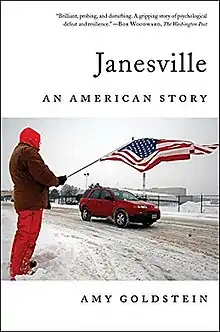Janesville: An American Story
Janesville: An American Story is a non-fiction book written by Amy Goldstein and published by Simon & Schuster in 2017. It covers the city of Janesville, Wisconsin, and follows the stories of several of its working-class inhabitants from 2008 to 2013, tracing what happens after the Janesville Assembly Plant shuts down.
 First edition | |
| Author | Amy Goldstein |
|---|---|
| Country | United States |
| Language | English |
| Subject | History |
| Publisher | Simon & Schuster |
Publication date | April 18, 2017 |
| Media type | Print (Hardcover) |
| Pages | 368 |
| Awards | |
| ISBN | 1-501-10223-0 |
| 330.9775 | |
Reception
It was named as a book of the year by The Economist,[1] one of 100 notable books of 2017 by The New York Times,[2] and one of 50 notable works of nonfiction in 2017 by The Washington Post.[3] Former President Barack Obama also named it one of the best books he read in 2017.[4]
It won the 2018 J. Anthony Lukas Book Prize[5] and the 2017 Financial Times and McKinsey Business Book of the Year Award.[6] The J. Anthony Lukas Book Prize, in its award description, called it "a triumph of narrative nonfiction" which "marshalls shoe-leather reporting and original social science into a panoramic portrait of workers, politicians, parents, teenagers, educators, business leaders, and a community struggling to find a way forward."[5]
Patti Waldmeir in The Financial Times states that Janesville "humanises the suffering of the white working class in America at a time when the country critically needs to understand the angst that helped elect the president."[7] Jennifer Senior of The New York Times called it "moving and magnificently well-researched."[8]
Michael Barone, writing in The Wall Street Journal, points out a pro-union bias in the book, but admits that it is "generally fair-minded".[9]
It also received favorable coverage from Joshua Rothman in The New Yorker[10] and Arlie Hochschild in The Washington Post.[11]
Janesville has been mentioned alongside Arlie Hochschild's Strangers in Their Own Land, J. D. Vance's Hillbilly Elegy, and Joan C. Williams's White Working Class as part of "a growing family of books about the evisceration of the working class in the United States" but which is set apart by "the sophistication of its storytelling and analysis."[8]
References
- "Books of the Year 2017". The Economist. 2017-12-09. Retrieved 2019-12-29.
- "100 Notable Books of 2017". The New York Times. 2017-11-22. Retrieved 2019-12-29.
- "50 notable works of nonfiction in 2017". The Washington Post. 2017-11-14. Retrieved 2019-12-29.
- Ducharme, Jamie (2017-12-31). "Here Are Barack Obama's Favorite Books and Music of 2017". TIME. Retrieved 2019-12-29.
- "Announcing the 2018 J. Anthony Lukas Prize Project Awards Winners and Finalists". Columbia Journalism School. 2018-03-28. Retrieved 2019-12-29.
- Hill, Andrew (2017-11-06). ""Janesville" wins the FT and McKinsey Business Book of 2017". The Financial Times. Retrieved 2019-12-29.
- Waldmeir, Patti (2017-08-21). "The gritty truth of life in America's heartland". The Financial Times. Retrieved 2019-12-29.
- Senior, Jennifer (2017-04-19). "In "Janesville," When the G.M. Plant Closed, Havoc Followed". The New York Times. Retrieved 2019-12-29.
- Barone, Michael (2017-04-25). "A Hollowed-Out Heartland". The Wall Street Journal. Retrieved 2019-12-29.
- Rothman, Joshua (2017-05-19). ""Janesville" and the Costs of American Optimism". The New Yorker. Retrieved 2019-12-29.
- Hochschild, Arlie (2017-04-20). "How workers coped after GM shuttered its Janesville plant". The Washington Post. Retrieved 2019-12-29.